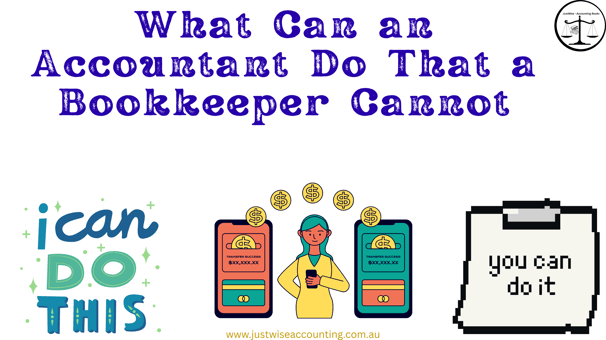What Can an Accountant Do That a Bookkeeper Cannot? | Justwise Accounting
Understand the key differences between accountants and bookkeepers. Learn what services accountants offer that go beyond bookkeeping duties.
Justwise Accounting
2 min read


What Can an Accountant Do That a Bookkeeper Cannot?
For many business owners, the terms bookkeeper and accountant are often used interchangeably. But while both roles are critical to financial clarity, they serve distinct functions. Understanding these differences can help you determine when to engage each service — and ensure you're not expecting one to do the job of the other.
Bookkeeper vs Accountant: Who Does What?
A bookkeeper is responsible for maintaining accurate day-to-day financial records. This includes:
Recording transactions
Reconciling bank statements
Managing accounts receivable and payable
Processing payroll (in some setups)
Coding receipts and expenses
Generating basic financial reports (profit & loss, balance sheet)
In contrast, an accountant provides a broader and more strategic layer of financial oversight. Their responsibilities often include:
Preparing and lodging business tax returns
Offering tax planning advice
Structuring your business for compliance and growth
Conducting financial forecasting and budgeting
Ensuring compliance with ATO regulations
Interpreting financial data for better business decisions
What Is Considered Full Charge Bookkeeping?
The term "full charge bookkeeping" refers to a more advanced bookkeeping role that handles not only regular transaction entry but also:
Managing the general ledger
Handling payroll and super
Preparing internal financial statements
Liaising with the external accountant for year-end close
While comprehensive, full charge bookkeepers still don’t replace accountants for tax strategy, formal lodgements, or business structuring.
Do Bookkeepers Do Payroll and Pay Bills?
Yes — many modern bookkeepers do assist with payroll, superannuation, and bill payments. This often depends on the engagement agreement and tools used (e.g., Xero with payroll add-ons). However, it’s important to note:
A bookkeeper can process payroll, but only an accountant can advise on payroll tax optimisation.
A bookkeeper can schedule payments and manage due dates, but they cannot provide advice on cash flow strategy or deferrals for tax efficiency.
When Do You Need an Accountant?
You’ll want to engage an accountant when:
Your business is growing and requires structural advice (e.g., trust vs company).
You need to prepare and lodge your BAS or income tax returns.
You require financial projections or loan applications.
You’re being audited or receiving ATO notices.
You want to reduce tax legally and improve profit margins.
The Best Setup: Bookkeeper and Accountant Working Together
For small to medium businesses, the most effective model is a collaborative approach:
The bookkeeper ensures your records are timely and accurate.
The accountant reviews, interprets, and advises based on that data.
This combination ensures financial hygiene and strategic direction — without unnecessary duplication or overpayment.
Final Thoughts
If you're unsure whether you need a bookkeeper or an accountant, the answer might be both — just at different stages of your business journey. Bookkeepers help you stay organised day-to-day, while accountants help you navigate the bigger picture.
At Justwise Accounting, we collaborate with both internal and external accountants to ensure our clients receive seamless, full-spectrum financial support.
Stay in Touch
© 2025 JustWise Accounting. All rights reserved. ABN 85 581 353 385
⚠️ We respect your privacy. Unsubscribe anytime. (under subscribe button)
Serving Australia-wide
Justwise acknowledge the Traditional Owners of the lands where we operate and pay respect to Elders past and present.
